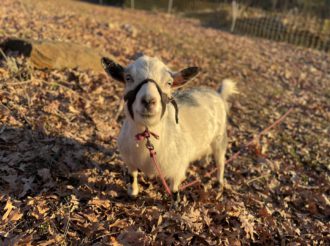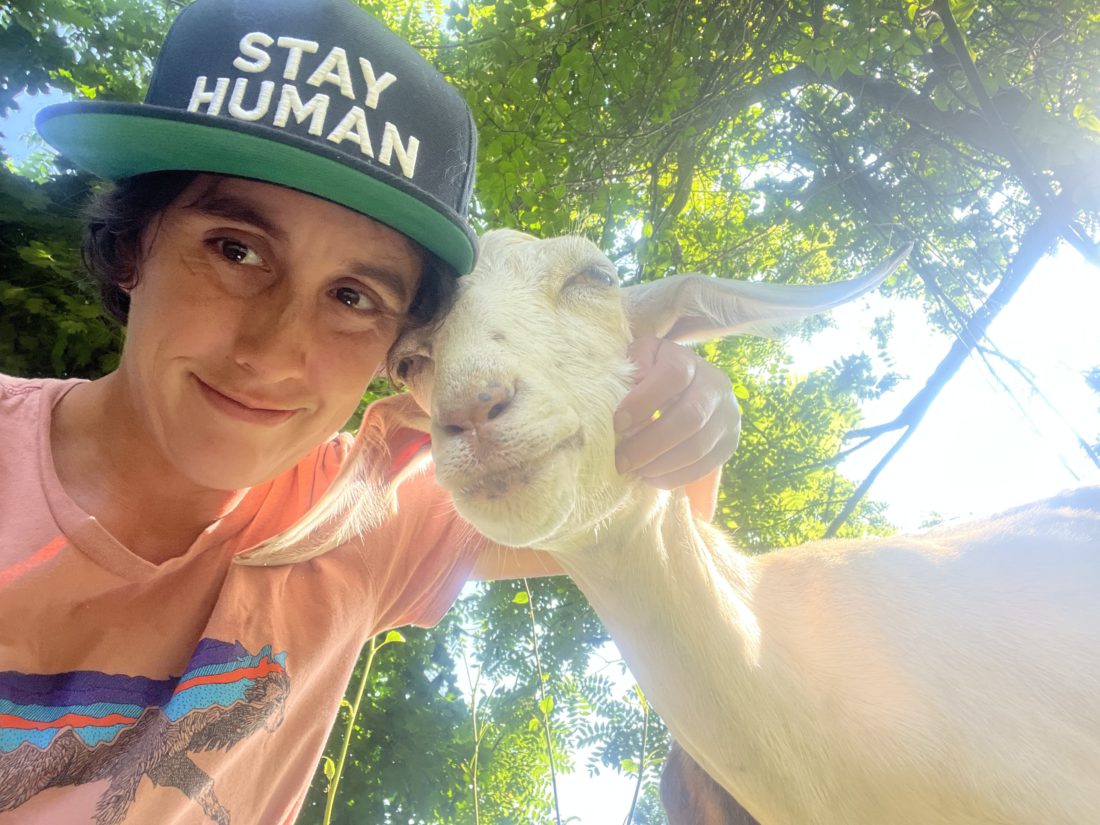According to the slogan of a certain agricultural machinery business, “nothing runs like a Deere.” But for individuals seeking a quieter, more environmentally conscious solution to land management, there’s no substitute for the slow grazing power of a herd of goats.
Sought out by everyone from private companies to local governments to area residents, these cloven-hooved mammals help clear properties of invasive species without the use of harmful chemicals or industrial noise and pollution. But as property owners soon discover, there’s more to this alternative approach than just letting goats roam free.
No kidding
Based in Barnardsville, Megan Naylor launched Mountain Goatscapes in 2014 after returning to her native Western North Carolina from a stint as a raft guide and ranch hand in Idaho. While working on the farm out west, she and her fellow hands were tasked by their boss with managing the property’s thistle problem.
“She wanted us to go around on horseback and dig it up with shovels. It sounds really romantic — it’s not,” Naylor says. “After about three days of that, I said, ‘I’m never going to look at another shovel again.’ My hands were all bloody.”
After a chance encounter with a baby goat at a local feed store, Naylor bought three goats, brought them back to the farm and used them as a sustainable means of controlling the thistle. When the time came to move back east and rehoming efforts didn’t quite work out the way she’d hoped, Naylor managed to bring one of the goats, Jasper, home with her. Once her Barnardsville neighbors learned of Jasper’s weed-chewing prowess, demand for his services grew, and Naylor saw an opportunity to start her own business.
“I researched it and realized I’m not reinventing the wheel,” she says. “Goats have been used for this for like, 1,000 years. But I thought maybe I can just do a different version and maybe I can do an even better job. There’s plenty of invasives in Western North Carolina.”
Mountain Goatscapes currently sports a herd of 30, and Naylor is able to rent additional goats from friends if necessary. She accepts any kind of job, from micro-backyards in West Asheville to corporate work to government contracts. Her goats have helped maintain city parks as well as assisted RiverLink and the French Broad Riverkeeper with stream bank restoration work.
Naylor starts booking in the winter but likes to do on-site consultations in early spring or late summer. A visit includes going through a checklist to make sure there aren’t any toxic plants that would be harmful to or even kill the goats; determining the size of the project space; talking with the property owner about the electric netting fence and the solar chargers that power it; and making sure that someone will be living on-site while the goats are there. If the land is in Buncombe County, she’s required to pull a permit through Animal Control.
“I tend to have three or four projects going at once, depending on the size of the projects,” Naylor says. “My job has evolved into wearing all the hats, but mostly doing management and being the front person that talks to clients. And then I go around and do my little rotation.”
These daily checks involve making sure the goats have sufficient water and all the fences are in good shape and determining if she needs to tell someone to please not feed the goats over the fence or, in more extreme circumstances, talk to the city or the Asheville Police Department.
Livestock in the outfield
Among Mountain Goatscapes’ satisfied clients is Larry Hawkins, general manager for the Asheville Tourists minor league baseball team. Seeking to clean up the hill behind the outfield wall at McCormick Field, extremely steep terrain that’s not safe for a person to stand and properly maintain the extensive growth of vines, Hawkins looked outside the typical landscaping box — albeit half-seriously at first.
“It initially started as a joke that we needed some goats — until we realized there was actually a company that performs the service,” Hawkins says. “After extensive evaluation of the property and modifications to ensure the safety of the goats, they were able to go to work and do what they do best.”

Hawkins quickly became impressed by how much the herd could accomplish in a few short weeks and was mesmerized by watching “the teamwork they use to reach items that seem out of reach.” As for the Tourists players, they likewise took a shine to their four-legged co-stars.
“They’re like little kids whenever they see the goats,” Naylor says. “It means a lot, too, because it really engages the community. They’re these big, tough guys and they’re all just ‘ooh’ing and ‘ahh’ing over these goats.”
Hawkins describes his experience with Mountain Goatscapes as “nothing short of amazing.” He says that Naylor has been an ideal communicator and that her genuine care for the animals has been evident from the start.
“The goats do a great job,” he says. “The only con I’ve found is sometimes the goats like to eat bark off of specific small trees, and the trees have a tendency to die afterward.”
Occasional bark-stripping is also one of the few qualms that Brock Ashburn, vice president of Highland Brewing Co., has from his experience with grazing goats on the brewery’s East Asheville property. He notes that for many years, well before Highland bought the entire tract in 2012, the 30 acres surrounding the building and parking lot were neglected. And though plenty of human power was expended in opening up trails and disc golf fairways, the goats have proved essential in clearing steep slopes and hard-to-access areas.
“Our property, though beautiful, has a dizzying array of invasive plants that must go,” Ashburn says. “Offerings include honeysuckle, multiflora rose, privet, kudzu, bittersweet, poison oak/ivy and English ivy, to name a few. Come to find out, goats love to eat this stuff.”
For his goat needs, Ashburn turned to the married duo Evelia and Alfredo Cedillo, with whom he’d previously worked on Highland’s property-related endeavors. Alfredo procured the goats, and multiple kids have joined the herd along the way.
To support the Cedillos’ efforts, Highland purchased movable solar-powered fencing and currently supplies regularly needed daily materials and provides nightly safe quarters for the goats in an old concrete mechanical room. Corey Harrison, Highland’s land management specialist, also provides frequent support.
“[The goats] are amazing partners that require little maintenance. The mobile fencing is relatively inexpensive and easily installed. If [on-site] nightly confinement is chosen, then there are hay, feed and bedding necessities that need to be considered,” Ashburn says. “The spent material will compost nicely. They can be a bit chatty at times and become quite adamant about treats if you happen to pass by when they are near. But overall, the pros far outweigh the cons.”
Set it and (almost) forget it
While goats are certainly low maintenance, Ashburn stresses that they’re not zero-maintenance animals. When the animals finish a section and are rotated to a new spot, humans are needed to clear vines, woody stems and other detritus left behind. And in his words, the goats “occasionally break out of jail” and may start chomping on your garden or a neighbor’s property, so it’s good to be mindful of the kind of damage they’re capable of inflicting.
Hawkins concurs with Ashburn’s assessment and says members of the Tourists staff have come in a couple of times and seen a goat roaming around the field or grounds area.
“You’d better have enough to keep them busy because they get bored and mischievous when they run out of food,” Hawkins says. “All in good fun, but they’re very good at escaping when they aren’t occupied by food.”
Leicester resident Jackie Barnes found out just how much work goes into maintaining grazing goats when he and his partner borrowed a trio of intact billy goats from a landscaper friend. Though Barnes closely manages the annual gardens by their house, pulling weeds by hand daily and judiciously scything down the brush, the farther stretch of their property from the drainage field to the wood line tends to become an impenetrable sea of poison ivy, poison sumac and wild blackberry in the spring and summer.
“In the past, the local electrical company has seen fit to keep this area in shape with a multiyear application of noxious chemicals,” Barnes says. “Since I disagree with the fitness of this strategy and was allowed the opportunity to tend to the area instead — under triennial review — I thought utilizing goats would be a good first step in clearing these more opportunistic, disturbed-area plants to make way for meadow plants to move in from the margins.”
The couple’s responsibilities were limited and mainly consisted of moving the goats’ solar-powered electric fence after the bramble buffet became depleted in each area. Barnes was soon reminded that “animals are complex creatures with minds of their own” and that when their will aligns with that of humans, as it did in the first few days of having the goats on their property, it can be “a nearly effortless partnership.”

“In those early days, I would come home from my day job, and whole squares of viny bramble would have been reduced to small piles of goat manure without me ever needing to break a sweat,” Barnes says. “However, as soon as they figured out that I was an inconsistent electrician and often unable to successfully complete the circuit of my fence setup, the partnership quickly degraded.”
After the illusion of the enclosure had worn away, near-daily escapes and difficult retrievals ensued — “It’s like they’re made out of lead or some other superdense material,” Barnes recalls of his attempts to wrangle the runaways — and they never managed to graze the goats through the whole tract. But two summers later, the areas where the goats did mow the bramble down now enjoy a diversity of native grasses and wildflowers that Barnes says is “greener and more vital from slow-release goat pellets than any application of ammonium-nitrate could ever yield.”
“Overall, I am a proponent of grazing goats as a method of landscape maintenance. I just think the low ecological impact, added fertilizer benefits and lack of machine noise vastly outweigh any downside,” he says. “That being said, I think it’s just one of those things where, no matter how capable a homesteader you think you are, it might be worth having a professional goat handler regularly on-site to monitor and help adjust their progress.”
Barnes’ broad thinking about environmental conservation is the type of ethical approach that Naylor hopes more people take, regardless of whether they use goats in the process. But with invasive species growing rampant in the region and Naylor wanting to keep Mountain Goatscapes’ herd to a manageable size, she says there’s room for other similar businesses, which has led to the rise of 2 Studs Ranch in Madison County and A Roxbury Goat Barn, which operates out of Landrum, S.C., but rents its goats for land-clearing jobs in Western North Carolina.
In turn, goatscaping is a growing industry because, in Naylor’s words, “it just makes sense: it’s nature solving nature’s problem.”
“They’re machines. That’s just what they’re made to do. It’s so cool to put them on a lot that you can’t see through, you can’t walk through and people are really overwhelmed by and to turn it into a community garden or somebody’s backyard,” she says. “I love making spaces harmonious with nature so that wildlife is happy and so that it’s beautiful and people want to be there.”






Nice piece. I wonder if you might include some details about price ranges for services.
Thanks! Prices vary depending on the project size, so best to contact the business owners directly.